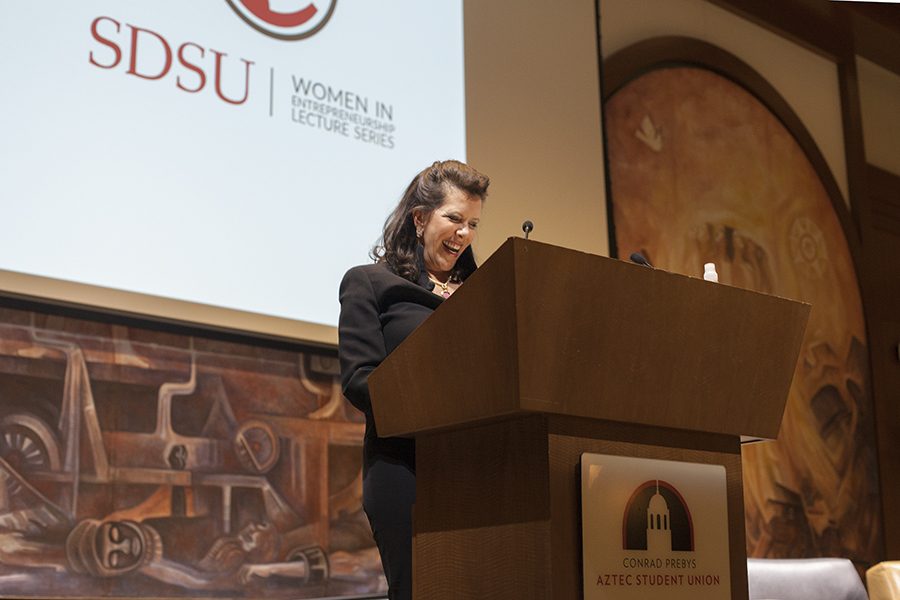A panel of women entrepreneurs spoke to a student audience on Feb. 9, and gave advice on starting and running a successful business.
The event, titled “WE Inspire,” was hosted by Karen Castles Gray, a Fowler College of Business Advisory Board member. Castles Gray, an entrepreneur and San Diego State mom, founded the Women in Entrepreneurship Lecture Series in 2016.
At SDSU, women make up a minority of students studying entrepreneurship. There are 357 undergraduate students enrolled in the management major with a specialization in entrepreneurship. Only 99 are women, comprising 27 percent of the major, according to the department of Analytic Studies & Institutional Research.
The lecture series was created to bring leading women entrepreneurs to campus once a year. “WE Inspire” was the lecture series’ inaugural event.
The event featured a panel of speakers that included Castles Gray, a fashion designer; Margaret Stagmeier, founder of TriStar, a real-estate investment firm; and Ann-Marie Griffith, managing director at APG Asset Investment.
The keynote speaker was Lonnie Ali, an entrepreneur, philanthropist, and wife and manager of the late Muhammed Ali.
Castles Gray spoke about her experience starting her own line of fashion, and gave advice on the importance of perseverance as an entrepreneur.
“Take rejection as a challenge, not a defeat,” Castles Gray said.
Lonnie Ali spoke to the attendees via Skype. She said it is important to be passionate in order to succeed.
“This job above all else needs to be what gets you up and going every day,” she said.
The speakers and attendees were optimistic about women’s success in the business sector.
“Women are starting to dominate a lot of markets,” senior marketing major Rachel Rodriguez said.
Following the speakers’ panel was an hour of networking. Fifteen women entrepreneurs hosted informal round table discussions with students, who were welcome to ask questions about starting a successful business.
Local entrepreneur Felena Hanson hosted one table. Hanson founded Hera Hub, a company she describes as similar to a start-up incubator, but geared toward women-owned businesses. She said she saw a need in the market for a community of support for women entrepreneurs.
Hanson said start-up incubators, which typically support start-up companies in the tech industry, were “designed for 22-year-old men,” and that women who are trying to start a business have different needs than male entrepreneurs, such as childcare support. She said women also have a mindset that often prevents them from enjoying the success their male counterparts might have.
“Women suck generally at having confidence in themselves,” Hanson said. “We want everything to be perfect before we unveil it, and that’s not business.”
Hanson also said that women’s approach to entrepreneurship can be an advantage, and has the potential to change the way businesses operate.
“One of the things we talk about at Hera Hub is that the old paradigm is competition,” she said. “But women are natural collaborators, and if we can bring that into our business, we can succeed. We’re all here to support and help each other.”
The 2016 State of Startups report, which examines multiple aspects of startup culture, indicated that women are still underrepresented in startups. 61 percent of founders said their boards were all-male. The report also found that that among respondents’ companies, later-stage startups were about three times less likely to have a women on their board.







